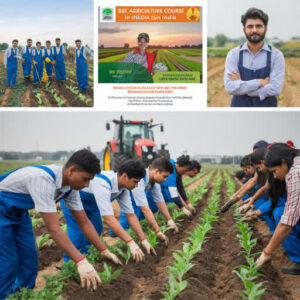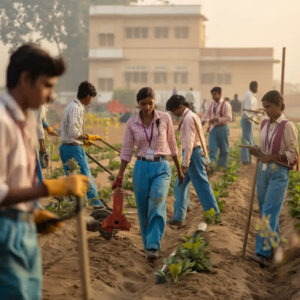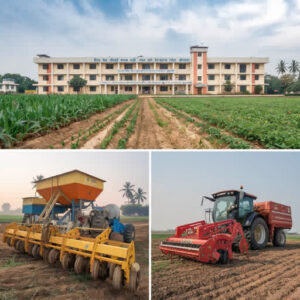BSc Agriculture Course: Learn the Bottom-line Agric Science
The BSc agriculture course targets students who have an interest in agriculture science and farming. Students apply agricultural principles, combined with practice, to prepare for careers in agriculture, farming, research, and rural development.
At this revolutionary time when the world is changing the course of agriculture to match the needs of an over-pressing population, big opportunities are there for the young professionals relating to giving a hand to sustainable farming and food security.
This blog provides full information on the BSc Agriculture Course, curriculum, and scope. If you are one of those who want to become an agriculture professional or someone who just wants to know what an agriculture course has in store for them, this guide will certainly break down and help understand what’s all included in this course.

What is BSc Agriculture Course?
The ‘BSc in Agriculture course’ is an undergraduate course. The duration of the course is four years to help graduates find knowledge about agricultural science in a theoretical as well as practical manner too. Some of the modules taken for this course include crop production, plant breeding, soil science, agricultural engineering, pest control, and agricultural economics. The purpose of this study curriculum is to gain knowledge in theoretical learning that is enhanced/improved by practical skills as well.
The course trains students in both classroom and practical experiences within the fields. It begins with higher secondary-level subjects like biology, physics, and chemistry and consists of eight semesters covering different areas of agriculture and allied fields.

Structure and Subjects for BSc Agriculture Course:
The BSc Agriculture course is designed with each semester focusing on a different agriculture discipline. Here are the typical subjects by semester:
~Semester 1:
Introduction to Agricultural Science
Introduction to the ‘BSc Agriculture course’ that introduces a student to the core of agriculture. Some of the main subjects are:
Agriculture Introduction: An understanding of the scope, importance, and history of agriculture.
Biology in Agriculture: Applied biology of plants and animals as they relate to agriculture.
Soil Science: Exposures to the study of soil as a natural resource and its function in agriculture.
Agro-ecology: An application of ecological principles to agriculture.
~Semester 2:
Crop Production and Agricultural Economics
The semester is purely focused on the culture of crops and agricultural economics with even more studies on the economic aspect of agriculture.
Crop Production: It focuses on how the crop will grow and develop and how the field crops will be handled.
Agricultural Economics: It introduces an economics concern to farming, since it deals with the production, consumption, and market trend.
Agricultural Chemistry: This is mainly dealing with the chemical reactions that alter plant growth and soil fertility.
Introduction to Agricultural Engineering: Introduction or basic knowledge of machinery, tools, and other technologies used in agriculture.
~Semester 3:
Plant Protection and Irrigation System
Techniques of plant protection and systems of water management also constitute the third semester in the ‘BSc Agriculture course’.
Plant Pathology: The study on plant diseases and their management.
Entomology: is the study of insects and has contributed to agriculture.
Irrigation and drainage systems: these are irrigation and drainage systems that maximize crop production.
Farm management: It describes the management of a farm business and activities.
~Semester 4:
Soil Fertility and Agricultural Extension
In semester four, BSc Agriculture will be interested in soil fertility and the extension service area, which includes the following:
Soil Fertility
Extension Service
Soils Fertility and Nutrient Management: The state of health of soils, fertilizers, and nutrients would be included in sustainable agriculture.
Agricultural Extension: This would enhance extension services that would enable the expansion of knowledge to be passed on to a farmer upgrading agriculture.
Agricultural Marketing: Science of the diverse functions carried out in marketing agriculture products.
~Semester 5:
High Technology Crop Production and Sustainable Agriculture.
The fifth semester covers advanced crop production with techniques as well as sustainability. High crop production relates to extensive knowledge about specific crops that is also associated with the technology used in their production.
Sustainability in agriculture: It relates to the values and practice which ensure long term sustainability in agriculture.
Agroforestry: is the study of a process that integrates woody species, especially trees, within agricultural landscapes.
Farm Mechanization: It involves a more in-depth study of the dominant machineries and equipment used in farming.
~Semester 6:
Agricultural Biotechnology and Environmental Management
BSc in Agriculture involves biotechnology and environmental studies as integral components. Such studies are undertaken in the sixth semester.
Agricultural Biotechnology Genetic Engineering and Plant Breeding
Environmental Management Issues caused by farming and agriculture
Agricultural Meteorology: Weather and Climate Studies and Their Impact on Agriculture
~Semester 7:
Rural Livestock Management Development
The seventh semester BSc Agriculture curriculum includes rural development and animal husbandry.
For example, rural development encompasses rural economics, policies, and programs that guide an approach to the improvement of rural livelihoods.
Livestock Management: The principles and practice applied in animal production and management have been adapted to farming.
Food Science and Technology: Fundamentals and Applications in Food Processing and Preservation.
~Semester 8:
Internship and Research Project Actually, the BSc Agriculture course is characterized by an internship and a research project in the final semester.
Internship: This offers a chance of getting practical working experience in farm practices, research institutes, or agri-based companies.
It will enable a student to go for a research project on any topic of interest within the scope of agriculture with the full support of faculty members.

Scope of Career Post in BSc Agriculture Course:
The course offers career opportunities on both national and personal levels in the public and private sectors. Opportunities include:
Agricultural Officer: Works with government offices or private establishments in managing agricultural operations.
Agricultural scientist: Focuses on improving crop productivity, besides resistance to pests.
Farm manager: Manages agricultural enterprises, such as seed production, agrochemicals, and farm equipment.
Agribusiness Manager: He supervises and carries out farm operations; he ensures the right use of means of production.
A Farm Advisor: It is a counselor who makes strategies on how crop yield can be enhanced through soil health and pest control.
Agricultural Entrepreneurship: Expands into entrepreneurship as a business venture, further subdivided into organic farming.